The latest evidence and resources for midwives and clinical support staff. You can either scroll through this page or click on any of the links below to jump to the relevant section.
- COVID-19
- Antenatal care
- Labour and birth
- Postnatal care and care of the newborn, including preterm infants
- Healthcare worker education and training
- Pelvic health
- Opportunities to get involved with Cochrane
-
COVID-19
-
COVID-19
This year, Cochrane is continuing to produce new and updated reviews in response to the pandemic. We have blogged about many of them and this blog COVID-19 evidence: a Cochrane round-up brings together a large collection of evidence and resources, starting from when this evidence was first being produced in spring 2020. Like the reviews themselves, all our blogs are updated to reflect new evidence.
Cochrane has also signed on to the World Health Organization’s call for action about managing infodemics and WHO’s Vaccine Equity Declaration.
External to Cochrane, you might be interested to read about this work being done on the Impact of COVID-19 and other conditions requiring isolation on the provision of fundamental nursing care in hospital.
Cochrane Special Collections
Cochrane Special Collections assemble Cochrane ReviewsCochrane Reviews are systematic reviews. In systematic reviews we search for and summarize studies that answer a specific research question (e.g. is paracetamol effective and safe for treating back pain?). The studies are identified, assessed, and summarized by using a systematic and predefined approach. They inform recommendations for healthcare and research. on important topics for the prevention and treatmentSomething done with the aim of improving health or relieving suffering. For example, medicines, surgery, psychological and physical therapies, diet and exercise changes. of COVID-19. They are developed with experts from our global Cochrane network. They are based on World Health Organization interim guidance, and continuously updated. You can find Coronavirus (COVID-19) Special Collections here.
Cochrane Podcasts
Cochrane COVID-19 Podcasts offer short summaries of Cochrane COVID-19 reviews from the authors themselves. A good way to hear the latest Cochrane evidenceCochrane Reviews are systematic reviews. In systematic reviews we search for and summarize studies that answer a specific research question (e.g. is paracetamol effective and safe for treating back pain?). The studies are identified, assessed, and summarized by using a systematic and predefined approach. They inform recommendations for healthcare and research. in under 5 minutes each.
Cochrane Clinical Answers
Cochrane Clinical Answers (CCAs) provide a readable, digestible, clinically-focused entry point to rigorous research from Cochrane Reviews. They are designed to be actionable and to inform point-of-care decision-making.
Each CCA contains a clinical question, a short answer, and dataData is the information collected through research. for the outcomesOutcomes are measures of health (for example quality of life, pain, blood sugar levels) that can be used to assess the effectiveness and safety of a treatment or other intervention (for example a drug, surgery, or exercise). In research, the outcomes considered most important are ‘primary outcomes’ and those considered less important are ‘secondary outcomes’. from the Cochrane Review deemed most relevant to practising healthcare professionals. The evidence is displayed in a user-friendly tabulated format that includes narratives, data, and links to graphics.
You can find Cochrane Clinical Answers related to COVID-19 here.
Antenatal care
Antenatal screening
Cochrane Clinical Answer: For pregnant women, what are the effects of antenatal screening on fetal growth and well‐being?
Gestational diabetes
Cochrane Review: Probiotics for preventing gestational diabetes (April 2021)
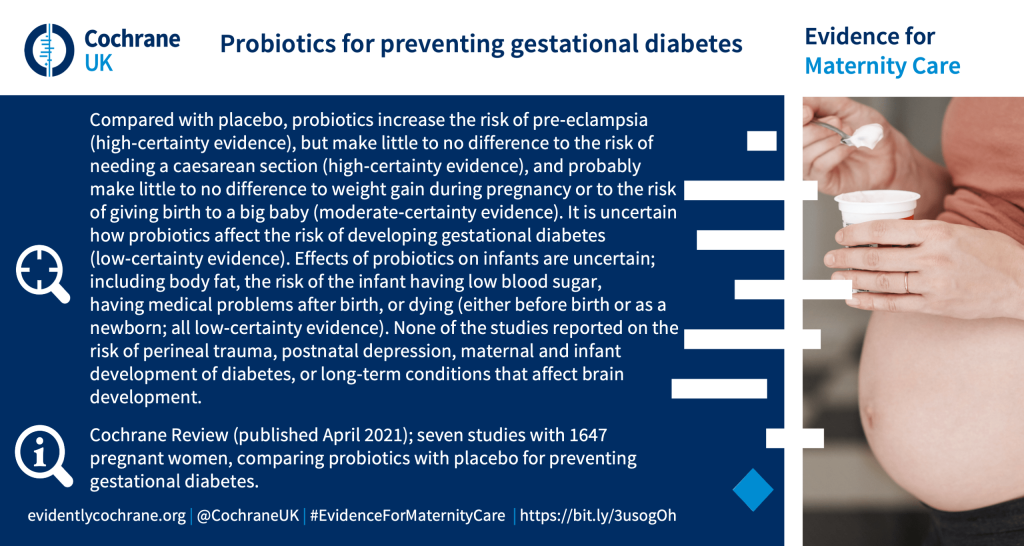
Midwife-led care
Cochrane Clinical Answer: For pregnant women, what are the effects of midwife‐led and trained traditional birth attendant–led care?
Pregnancy in women with long-term conditions
In her blog Balancing diabetes and pregnancy: the keys are shared decision-making and technology Emma Doble, who lives with Type 1 Diabetes and gave birth for the first time in 2020, reflects on her pregnancy journey and afterwards.
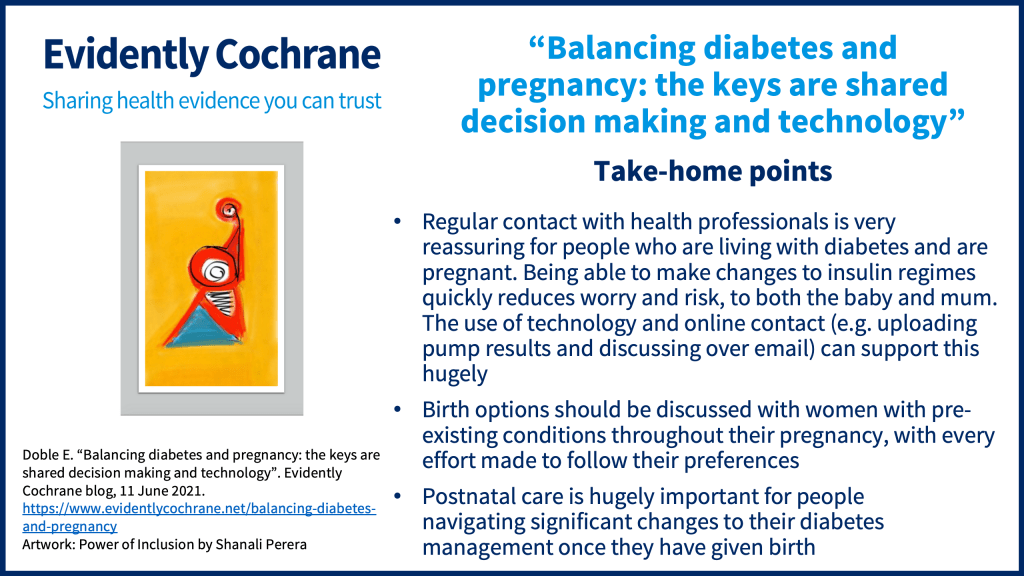
In their blog Contemplating pregnancy with long-term health conditions, Rachel Plachcinski and Ngawai Moss discuss the lack of evidence for planning pregnancy and maternity care for women with two or more long-term health conditions.
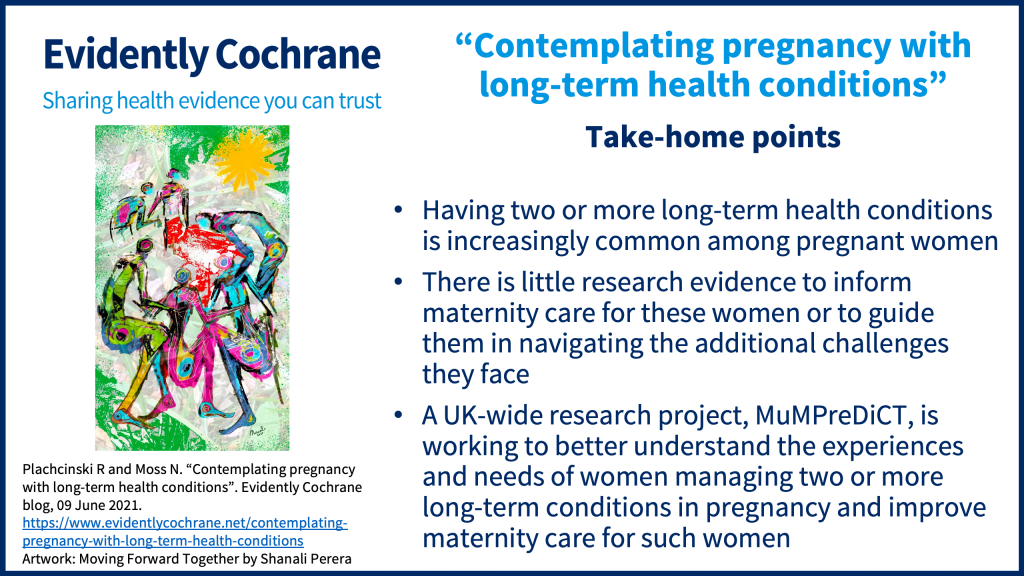
These blogs are among several in Living with long-term conditions: a Cochrane UK special series.
Preventing miscarriage
Cochrane Review: Progestogens for preventing miscarriage: a network meta‐analysis (April 2021)
Cochrane Clinical Answers:
Preventing stillbirth
Podcast: What are the most effective interventions during pregnancy for preventing stillbirth?
Preventing venous thromboembolism
Cochrane Review: Venous thromboembolism prophylaxis for women at risk during pregnancy and the early postnatal period (March 2021)
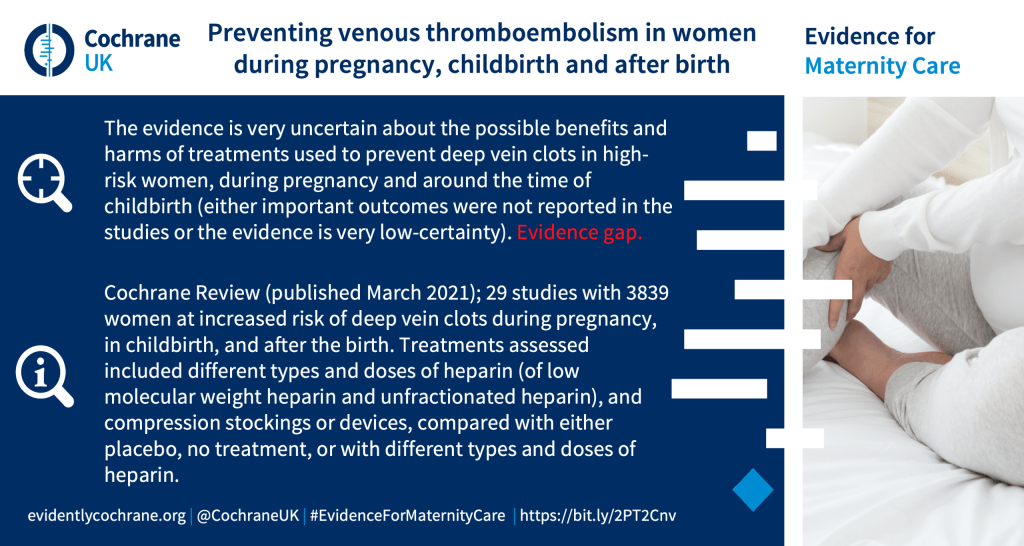
Smoking cessation in pregnancy
Cochrane Clinical Answer: For pregnant women, what are the effects of smoking cessation interventions?
Vitamin and mineral supplementation
Cochrane Clinical Answers:
How does zinc supplementation improve pregnancy and infant outcomes?
Labour and birth
Induction of labour
Featured review: Low-dose misoprostol given by mouth for induction of labour
Reducing nausea and vomiting
Featured Review: Reducing nausea and vomiting in women having a caesarean birth with regional anaesthesia (May 2021)
Cochrane Clinical Answer: For women undergoing regional anesthesia for cesarean section, which medications prevent nausea and vomiting?
Postnatal care and care of the newborn, including preterm infants
Antibiotics for early-onset neonatal sepsis
Cochrane Review: Antibiotic regimens for early‐onset neonatal sepsis (May 2021)
Bed sharing
Cochrane Review: Bed sharing versus no bed sharing for healthy term neonates (April 2021)
Early postnatal discharge from hospital
Cochrane Review: Early postnatal discharge from hospital for healthy mothers and term infants (June 2021)
Feeding preterm infants
Cochrane Review: Continuous nasogastric milk feeding versus intermittent bolus milk feeding for preterm infants less than 1500 grams (June 2021)
Ibuprofen for preventing patent ductus arteriosus
Cochrane Clinical Answer: What are the benefits and harms of ibuprofen for preventing patent ductus arteriosus (PDA) in preterm and/or low birth weight infants?
Management of transient tachypnoea of the newborn
For this recent Cochrane Review: Fluid restriction in the management of transient tachypnea of the newborn (February 2021) there is now a Cochrane Clinical Answer: How does restricted fluid management compare with standard fluid management for preventing transient tachypnea in neonates?
Opioids for ventilated newborns
Podcast: Opioids for newborns receiving mechanical ventilation
Perineal pain
Cochrane Clinical Answer: How does acetaminophen (paracetamol) compare with placebo for women with early postpartum perineal pain following episiotomy during childbirth?
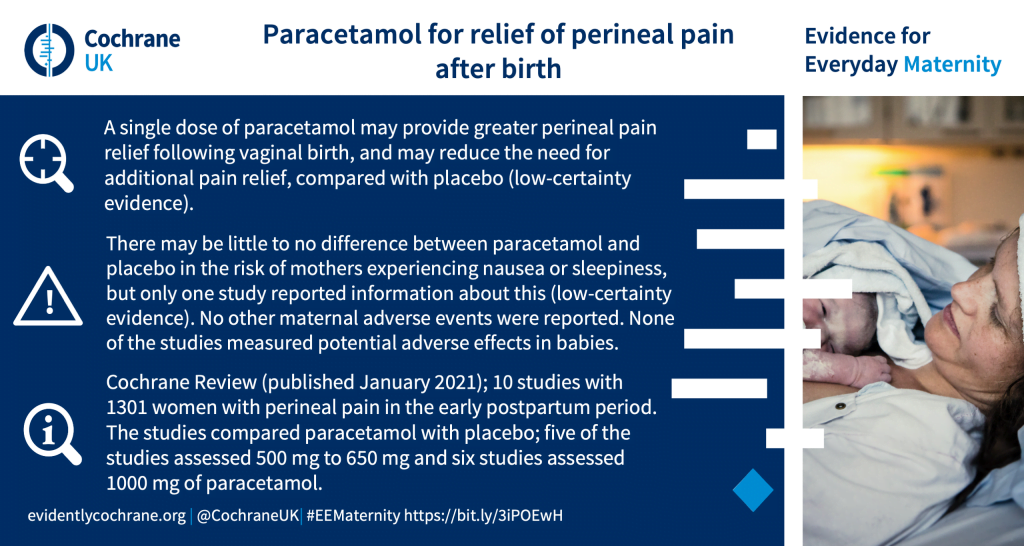
Postnatal depression
Podcast: Antidepressant treatment for postnatal depression
Postpartum haemorrhage
Cochrane Clinical Answer: How do uterotonic agents compare for first‐line treatment of postpartum hemorrhage?
Preventing hypoglycaemia
Cochrane Review: Oral dextrose gel to prevent hypoglycaemia in at‐risk neonates (May 2021)
Cochrane Clinical Answer: What are the effects of oral dextrose for preventing hypoglycemia in at‐risk neonates?
Sedatives for opioid withdrawal in newborns
Cochrane Review: Sedatives for opioid withdrawal in newborn infants (May 2021)
Cochrane Clinical Answer: For newborn infants with opiate withdrawal, how do different sedatives compare?
Surfactant therapy
Cochrane Review: Surfactant therapy via thin catheter in preterm infants with or at risk of respiratory distress syndrome (May 2021)
Topical emollient for preventing infection
Cochrane Review: Topical emollient for preventing infection in preterm infants (May 2021)
Cochrane Clinical Answer: How do topical emollients compare with routine skin care for preventing infection in preterm infants?
Healthcare worker education and training
Cochrane Reviews:
Education and training for preventing sharps injuries and splash exposures in healthcare workers (April 2021)
Cochrane Clinical Answer: Can multi‐professional simulation‐based team training improve patient outcomes and trainee performance in obstetric emergencies?
Pelvic health
Myra Robson, a pelvic health physiotherapist, has written an Evidently Cochrane blog Pessaries for pelvic organ prolapse – looking at the Cochrane evidence.
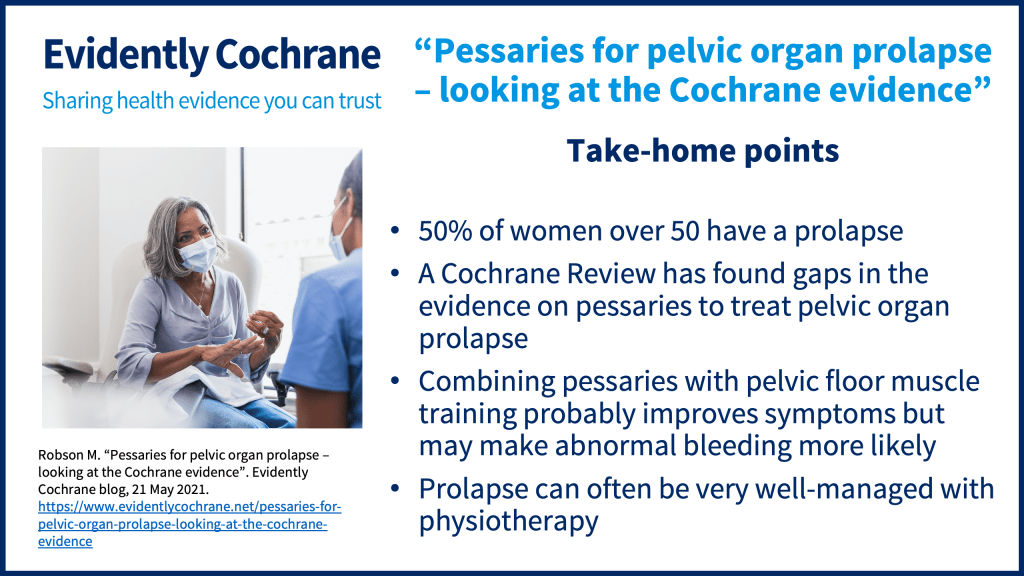
NICE seek comments on draft guidance on pelvic floor dysfunction
NICE has recently published draft guidance on pelvic floor dysfunction and the importance of exercises and has opened a period of consultation from stakeholders, until 9 August 2021.
Opportunities to get involved with Cochrane
On this page, Important Cochrane Links, you can find opportunities to get involved, including how to join Cochrane, find volunteer tasks, or jump into the Cochrane Library.
Find out more about Cochrane’s Early Career Professionals Group and their upcoming activities.
Please note that this page includes a round-up of materials mainly published within the last three months, and is not updated after it’s posted.
Join in the conversation on Twitter with @SarahChapman30 and @CochraneUK or leave a comment on the blog.
Please note, we cannot give medical advice and do not publish comments that link to individual pages requesting donations or to commercial sites, or appear to endorse commercial products. We welcome diverse views and encourage discussion but we ask that comments are respectful and reserve the right to not publish any we consider offensive. Cochrane UK does not fact check – or endorse – readers’ comments, including any treatments mentioned.
Sarah and Selena have nothing to disclose.


